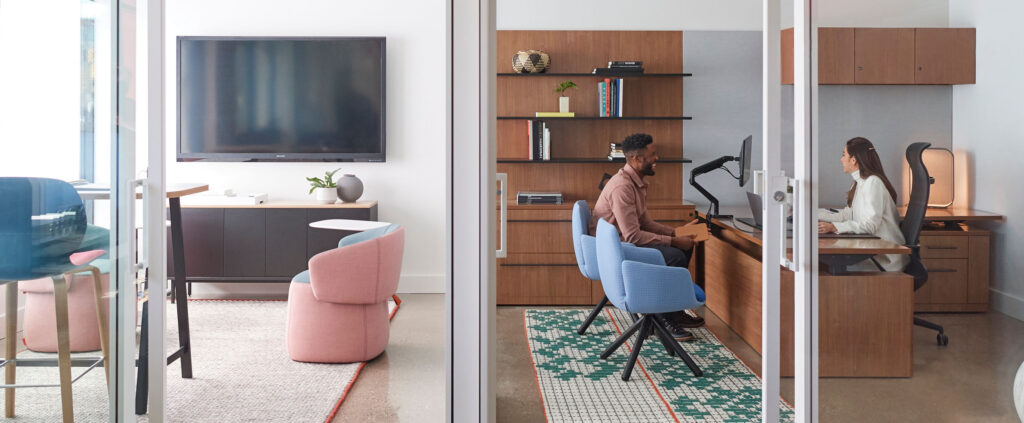7 Legal Workplace Trends: The Evolving Landscape of Law Firm Design
The legal industry is evolving rapidly, with advancements in technology and changing workplace dynamics reshaping how legal professionals operate. While the core functions of law firms remain the same—the way legal professionals work is changing. From AI-driven efficiencies to shifting perspectives on office culture, law firms are rethinking their spaces to attract top talent, enhance productivity, and build stronger organizational cultures.
1. Office First: A Return to In-Person Collaboration
The office-first approach continues to be what most law firms want, particularly for professional staff, and firms are leveraging workplace design to create compelling environments. The goal? To enhance collaboration, reinforce firm culture, and ensure the legal profession remains competitive.
Law firms build culture through relationships—mentorship, teamwork, and shared institutional knowledge all play a crucial role in professional growth. Many firms are now embracing an “office-first” mindset, particularly for professional staff. Having employees physically present strengthens firm culture, enhances long-term career development, and fosters organic collaboration. Now legal firms are developing new trends that support their people, process, and place.
While hybrid work remains prevalent, leading firms are ensuring that time spent in the office is meaningful. High-quality ancillary spaces with intentional design provide opportunities for informal interactions, mentorship, and knowledge-sharing that drive career progression and firm success.
2. AI and Technology: A Game Changer for Legal Work
Artificial intelligence is revolutionizing the legal industry. AI-driven tools are enhancing productivity, automating routine tasks, and enabling attorneys to focus on strategic analysis rather than administrative burdens.
Most attorneys expect new legal professionals to have at least a basic familiarity with AI upon hiring, with 57% of lawyers expecting associates to have AI experience. This shift is particularly beneficial for mid-sized firms, allowing them to compete more effectively with larger firms by improving efficiency and output.
However, as AI tools become more sophisticated, law firms are also grappling with new challenges—including data security, ethical considerations, and the need for skilled professionals who can oversee and integrate AI technologies effectively. As AI continues to evolve, firms must create workplace environments that support both legal expertise and technological proficiency.
Woman Sitting at Masters Series Desk
3. The Workplace Creates a Hub for Well-Being
A well-designed legal workplace offers a range of spaces that accommodate different work needs. Private offices for focused legal work, collaboration areas for teamwork, and wellness spaces for relaxation all contribute to a workplace that fosters productivity and well-being. By designing environments that support a diverse workforce, firms create spaces that attract and retain top talent.
4. Attracting Talent with New Skills
Legal teams are no longer made up solely of attorneys and paralegals. The increasing reliance on AI, IT infrastructure, and data protection has expanded the skill sets needed within law firms. Cybersecurity experts, data analysts, and AI specialists are becoming essential members of legal teams, ensuring that firms can manage sensitive client information and maintain compliance with evolving regulations.
As a result, law firms must rethink their office environments to accommodate these diverse roles. Tech-enabled workspaces, secure collaboration areas, and flexible office layouts are key to supporting an evolving workforce.
5. Space and Location Matter More Than Ever
For top law firms, location remains a key differentiator. Firms continue to invest in premium real estate, choosing locations that offer lifestyle benefits alongside professional advantages. Proximity to courts, business hubs, and prestigious addresses still matters, but so does access to amenities, transportation, and vibrant neighborhoods that support a balanced work-life experience.
Inside these offices, firms are prioritizing best-in-class spaces with hospitality-driven amenities. High-end conference rooms, social lounges, wellness areas, and top-tier dining options all contribute to an environment where legal professionals can thrive. The goal is to create a space that feels both prestigious and functional—one that reflects the firm’s stature while supporting the evolving needs of its workforce.
6. The Experience of Work: Building Loyalty from Day One
Employee loyalty begins the moment a candidate walks through the firm’s doors. Workplace experience plays a critical role in shaping perceptions, from recruitment to long-term career growth.
Savvy firms are leveraging workplace design to enhance their culture, reinforce their brand, and create environments where employees feel supported and engaged. This means designing offices that reflect the firm’s identity, provide a seamless blend of collaboration and focus spaces, and prioritize comfort and well-being. A well-designed office doesn’t just attract talent—it nurtures it, ensuring professionals feel connected to their firm and its mission.
7. Sustainability: A Growing Priority for Legal Workplaces
Sustainability is becoming a key focus for law firms—particularly as younger professionals seek employers with a strong environmental commitment. Many firms are integrating sustainability initiatives into their workplace strategies, incorporating energy-efficient design, sustainable materials, and wellness-driven spaces into their office environments. Law firms are also increasingly seeking to recruit lawyers with expertise in environmental law, renewable energy, and sustainability to meet the demands of a rapidly changing world.
A commitment to sustainability is not just about reducing a firm’s environmental footprint—it’s also about creating a workplace that aligns with employee values. From LEED-certified buildings to green spaces and biophilic design, law firms are recognizing that a sustainable workplace is a competitive advantage in attracting top-tier talent. By collaborating with suppliers who prioritize sustainability, firms can further enhance their commitment to creating eco-friendly and appealing office environments.
The legal workplace is adapting to new challenges, technological advancements, and shifting workforce expectations. Law firms that embrace these trends—by investing in high-quality office spaces, integrating AI-driven efficiencies, and prioritizing sustainability—will be well-positioned for long-term success.
By creating environments that support both legal professionals and the broader team members who enable their success, firms can reinforce their culture, enhance collaboration, and ensure they remain competitive in an increasingly dynamic industry.
